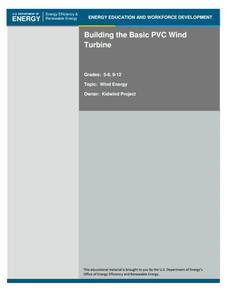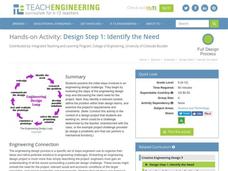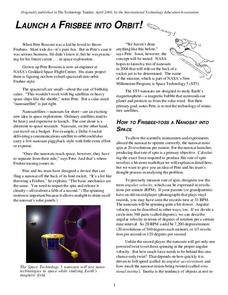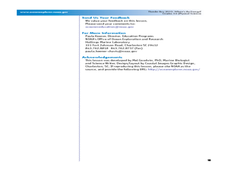Curated OER
Destination Outer Space
Students investigate space travel. In this space travel lesson students examine space exploration history, engineers and scientists involved in space exploration, and Newton's third law of motion. Students make rockets.
Teach Engineering
Fluid Power Basics
What can bulldozers and screen doors have in common? Use this lesson on fluid power to find out. It begins with some simple teacher demonstrations, includes a couple of videos, and culminates with an inquiry-based activity to investigate...
US Department of Energy
Building the Basic PVC Wind Turbine
Here is a comprehensive and well-written lesson plan that results in learners building a standard wind turbine. Once built, teens can design a variety of experiments to test different factors. This activity is a noble undertaking that...
Curated OER
Simple Machines and Modern Day Engineering Analogies
Learners apply the mechanical advantages and problem-solving capabilities of six types of simple machines (wedge, wheel and axle, lever, inclined plane, screw, pulley) as they discuss modern structures in the spirit of the engineers and...
Teach Engineering
Design Step 1: Identify the Need
What exactly does an engineer do? Learners find out through a lesson that asks them to solve a problem that affects a target population. Aspiring engineers learn the steps of the engineering design process as they apply it to a challenge...
International Technology Education Association
Launch a Frisbee into Orbit!
How fun it must be to play Frisbee in space! That is just what a NASA engineer gets to do, and you can learn how, too. Follow the instructions provided in this informational article to create your own satellite launcher. Afterward,...
Curated OER
Engineering
Students examine how Shell uses engineering. In this engineering principles lesson students visit a web-pages, answer questions, and examine the ways that engineers go about exploring different ideas.
Curated OER
Where's the Energy
Students research energy conversions. In this energy lesson, students describe the basic operation of a steam engine. They explain the energy conversions in the steam engine's operation.
Curated OER
Move It! With Simple Machines
Students explore engineering by participating in a mechanical class activity. In this simple machines lesson, students identify many simple machines that allow them to perform tasks easily each day. Students collaborate in small groups...
Teach Engineering
An Introduction to Air Quality Research
Viewers are a PowerPoint are exposed to the idea that pollutants are in more than just the air we breathe. the presentation provides information about the layers of the earth's atmosphere and takes a look at the pollutants in the...
Curated OER
All Steamed Up
Students examine the energy conversions and simple machines are involved in the operation of a steam engine. They make a replica of a small steam engine.
Teach Engineering
You've Got to See it to Believe It!
Youngsters develop an understanding of how smog is produced, and how exhaust from automobiles is one of the major sources of smog. They explore the roles that engineers play in developing technologies that reduce smog, then work in teams...
Teach Engineering
How a Hybrid Works
Work with your class to connect series and parallel circuits to hybrid cars. The lesson introduces basic circuit diagrams before having scholars apply the understanding of the difference between parallel and series circuits to hybrid cars.
Curated OER
Levers and Pulleys
Seventeen pages of material leave you well-prepared to carry out this lesson on levers and pulleys. Photos and diagrams make the instructions clear; resource links provide additional information. The missing aspects of this teacher's...
Rochester Institute of Technology
Biomechanical Joint
Discuss mechanical advantage and how the human body moves/works. Learners focus on bioengineering, working together to build a functioning mechanical arm. Additionally, they analyze an air muscle, discussing its appropriate use in humans.
Teach Engineering
Magnetic Fluids
Teams work as material engineers to create ferrofluids, whose shape is influenced by magnetic fields. The activity, which is the fourth in the six-part series, has the teams create magnetic ink and use it to write, testing it with a...
Curated OER
Steamship Portland: Where's the Energy?
Learners examine how steamships operate. They describe the necessary energy conversions. They construct a model paddlewheel ship. They use rubber bands as examples of potential and kinetic energy as they unwind and set the models in motion.
Institute of Electrical and Electronics Engineers
Give Me a Brake
Learners explore the concept of how brakes can stop or slow mechanical motion. They examine the operation of a bicycle brake and use low cost materials to devise a simple braking system. Finally, they work as a team to suggest...
Teach Engineering
Archimedes' Principle, Pascal's Law and Bernoulli's Principle
What do Pascal's law, Archimedes' Principle, and Bernoulli's Principle have to do with fluid mechanics? The included PowerPoint presentation provides the basic definitions and equations associated with the three. A set of homework...
Curated OER
Airplane flight
High schoolers learn the basic concepts about airplane flight. They learn the reason jetliner wings are swept back and why jet engines have replaced propellers in high-speed flight.
Curated OER
Basic Introduction to Foundation of Life: Genes, Genetics and Genetic Diseases
Students are introduced to genetics along with genetic diseases and heredity. In groups, they complete a Punnett Square to determine the dominant and recessive genes. After viewing diagrams, they identify the characteristics of DNA and...
Curated OER
Building the Car (Mechanics and Motion)
Learners design and begin building a car out of K'NEX parts after a class discussion on the components of the car, the constraints and goals of the design, the type of testing that will be performed, and a demonstration of a basic...
Teach Engineering
Amusement Park Ride: The Ups and Downs in Design
Groups design the ultimate roller coaster by considering potential and kinetic energy. They test their designs using marbles and then go on to rate each group's design based on aesthetics, loop diameter, and cost.
DiscoverE
Conveyor Belt
Convey your interest in conveyor belts. By considering different size tubes, groups create a conveyor belt that can transport boxes of candy at least four feet. Also, the conveyor belt must make a 90-degree turn—quite a difficult task!

























